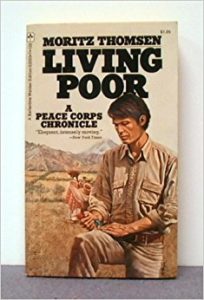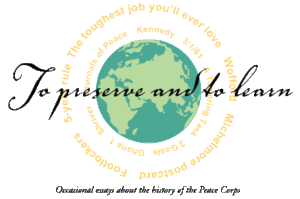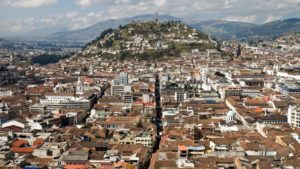Mike Tidwell remembers Moritz Thomsen (Ecuador)
Moritz Thomsen (Ecuador 1965-67) died of cholera in Guayaquil, Ecuador on August 28, 1991. In March 1993 in our newsletter Peace Corps Writers we published an essay entitled “Ashes on the River Esmeraldas” written by Mike Tidwell (Zaire 1985-87).
Tidwell who had published his Peace Corps story The Ponds of Kalambayi: An African Sojourn that won the RPCV Writers & Readers’ Paul Cowan Non-Fiction Award in 1991. Mike’s book, Sargent Shiver told me, was one of the best accounts of Peace Corps service.
•
Ashes on the River Esmeraldas
Quite fitting that on my first morning in Quito, Ecuador, there to visit the buried ashes of Moritz Thomsen, I watched a dirty waif wrap his arms around a gringo tourist’s leg, begging for coins, refusing to let go. To free himself, the tourists made the boy fetch like a pathetic dog, throwing some coins toward a trash heap, then fleeing. This happened against a backdrop of turquoise volcanoes, on a crystalline Sunday morning, with Quito’s most glorious cathedral just yards away, its spiraling columns meant to suggest human ascendance toward heaven, toward perfection and peace.
Moritz got it right in Living Poor, still our best Peace Corps memoir, when he said of the overseas volunteer experience, “I felt all my defenses against sadness being stripped away, and my defenses against happiness, too. I became completely vulnerable at least to the joys and horrors of . . . life.”
Horrors especially, perhaps. It was horror I felt that first morning in Quito, and horror in spades when I learned of Moritz’s death two summers ago. Wasn’t it enough that this man who packed more truth and emotion and wisdom into each page of his three books than most of us can muster in a year of scribing—wasn’t it enough that he went through the rigors of emphysema? But to script the final moments with cholera—well, that’s too awful to think about. So I don’t.
And the joy of life. Yes, the world serves it up, in doses. I was happy arriving on the Ecuadorian coast, seeing the vast Pacific open up, making my way toward Río Verde, Moritz’s old Peace Corps village. My contacts in Quito said Moritz’s ashes were likely there. Journeying closer, I saw the big brown pelicans Moritz described in Living Poor, flying in bomber formation across the shore. I saw the fishing villages below white bluffs that jut toward the ocean like a dare. And the sculpted black women carrying impossible loads. It was all the stuff Moritz put down on paper in that inimitable style of his, making us gave with exuberant wonder—as if for the first time – at life’s simplest details, good and bad.
It was late when I reached Río Verde, north of Esmeraldas. The village had change since Moritz left in 1969. The main street is paved; the whole village was electrified four years ago. But it’s still small and very poor. Bamboo still informs much of the architecture.
I walked around, finding Alexandro and Rufo and Walter Pata and Alvaro, the storekeeper—all characters from Living Poor, members of that mad, story, gorgeous microdot of humanity Moritz gave to us. In my eyes they were celebrities, these people, as one by one they voiced their grief over Moritz’s passing. They talked of memories: Moritz carrying a sow on his back five miles for a sick farmer; Moritz making bad marmalade; Moritz weeping uncontrollably and smashing things after the death of a neighbor’s child. When I asked about the ashes, I was told they had been scattered across the Esmeraldas River per Moritz’s wishes before he died.
I later had my moment on the Esmeraldas, sitting reverently on a bank where it flows into the Pacific. The tide was going out, the sun was setting and I was silent. Moritz would have found this hideously pretentious, I’m sure. And actually, if it was a connection I sought, a final closeness, it came less on the river than in Río Verde itself, sitting with the people who knew him. It was on the beach in Río Verde, for instance, that I met Wai.
Wai was the fisherman here, my favorite of Moritz’s characters. I watched Wai tack toward shore in a rickety sailboat, sombrero on his head, a catch of fish at his feet. Landing, he drew out a machete and shimmied up a tree and produced a lunch of fresh coconuts. Wai is great. Wai is simple. “Don Martín [Moritz] taught me how to make wooden stools,” Wai said. “I miss Don Martín.”
The main projects Moritz launched—raising chickens and pigs—were abandoned soon after he left, Wai told me. Not a Peace Corps first. Wai also said, confirmed by others, that between 1969 and his death last year, Moritz never returned to Río Verde, not once. I wonder why. He lived just miles away for much of that time.
I saw Senore Vicenta last, visiting her sun-bleached house on stilts. She is 80 now. When I arrived, she was singing to herself in a rocking chair, barefoot, amazingly wrinkled, a ribbon in her hair. A smile gave way to watery eyes when we talked about Moritz.
“Dios Mio, Dios Mio. I loved that man. He drank too much coffee. He could be a bastard when he was angry. But he wanted to help me. No one had ever wanted to help me before.” Slow tears began falling.
 It made sense, of course, the fierce emotion with which these people spoke of Moritz, as if 1969 were just yesterday. I’ve read his books. I know the power they have. But Vicenta knew him personally, she had the walks on the beach, the conversations at noon under a shady eave.
It made sense, of course, the fierce emotion with which these people spoke of Moritz, as if 1969 were just yesterday. I’ve read his books. I know the power they have. But Vicenta knew him personally, she had the walks on the beach, the conversations at noon under a shady eave.
Before I left, I gave Vicenta the author photo from my copy of Living Poor. As I walked out the door she was rocking in her chair, sobbing uncontrollably now, the photo of Moritz gathering tears in her lap as sea waves crashed outside her window. Moritz left a lot of fingerprints on a lot of souls, but the strongest surely are in Río Verde, and that is where the visitor will always find his spirit, with Vicenta and Wai and Alexandro, where it all began. Maybe that’s why he never went back. He didn’t have to.
•
Today Mike Tidwell, author of half a dozen books, is founder and director of the Chesapeake Climate Action Network, a grassroots nonprofit organization dedicated to raising awareness about the impacts and solutions associated with global warming in Maryland, Virginia, and Washington, D.C..




Being, as he was, a non-typical “older volunteer”, it would be interesting for readers to know what Moritz Thomsen’s earlier pre-PC life was about. Apparently something he hadn’t any interest in returning to, or reexamining. Any insights, John et al ? John Turnbull New Mexico
I had read Living Poor before arriving in Quito during the South American fall of 1988. Even though we had spent six weeks living in Mexico City prior to this, the nine thousand feet Andean elevation gave me headaches. Within days, the headaches disappeared. I visited the Peace Corps office where I met Nelson Proaño who had worked as a staff member since the Peace Corps Ecuadorian inception. He smiled as he told me, “There is not a crook or cranny in Ecuador that has not been served by a volunteer. Everybody remembers the Gringo who helped them build a school, clinic, a water system.” Thomsen, I was told., was alive but in poor health so we demurred from bothering him.
While in Quito, a local architect and university professor, Jorge Benavides Solis, had counseled us to avoid Guayaquil if possible due to disease and crime. Gangs roved public parks during daytime hours, robbing. Only a few weeks later while in Cuenca, I read a newspaper article about a Peruvian cholera epidemic that was moving north. An inoculation against it was now necessary for entrance to that country. Well, my sister-in-law traveling with us had not gotten that shot. Cuencan clinics were out of cholera serum and told us to go to Guayaquil. We had no choice. Our stay in Guayaquil was very short. Ironically, we stayed in a working-class neighborhood probably blocks from Thomsen’s apartment.
Wonderful piece, Mike. Love the vivid details. What a legacy Moritz left behind.